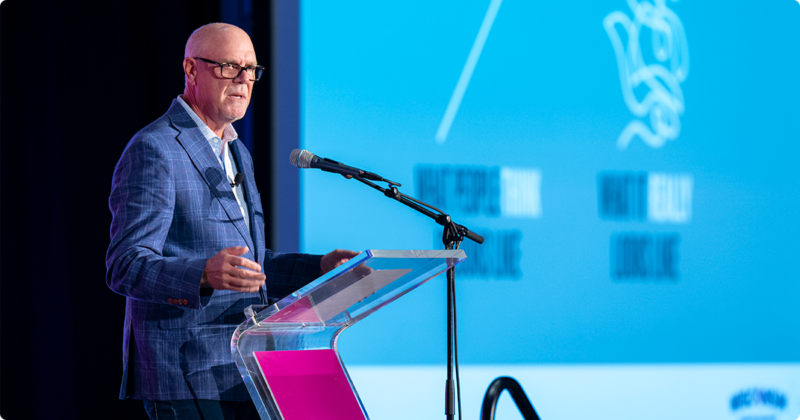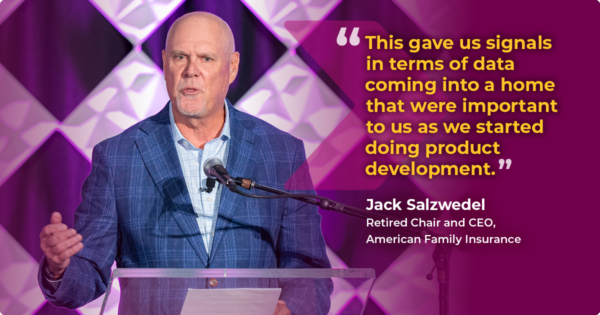
At the Wisconsin Economic Summit 2024 in La Crosse, Jack Salzwedel, retired chair and CEO of American Family Insurance, spoke about how the company transformed its culture.
American Family Insurance, seen as stodgy and change-resistant in 2010, used forced and planned innovation to remake itself in recent years, becoming an industry leader and transforming its culture.
Jack Salzwedel, retired chair and CEO of the Madison-based insurer helped drive those changes and spotlighted the benefits of the firm’s innovation crusade for those attending WEDC’s third annual Wisconsin Economic Summit in La Crosse Oct. 15-16.
Early in the 2000s, one industry expert wrote in a trade publication that American Family was a “sleepy Midwestern mutual famed for its remarkable inability to modernize.”
“It was a gut punch to the leaders of American Family, where we realized that not only were we seeing things that weren’t the greatest as an organization, but actually the industry was seeing it as well, and that we needed to actually do some pretty substantial things to see our trajectory change,” said Salzwedel, who retired in 2021 after a decade leading the company.
The insurer was struggling with legacy technology that was based on what Salzwedel called “spaghetti logic.”
“If you start making a change in one side of this technology stack and you need to change a rate or change a product on the other side, it had to go through all this technology spaghetti in order to get to the other side,” he said.
The company invested heavily in its technology platforms to simplify them and make them more responsive. Data and analytics became a central part of the turnaround. It started a data and analytics lab and support the University of Wisconsin-Madison’s data science programs. The insurer invested in Ring, the smart home company early on.

“This gave us signals in terms of data coming into a home that were important to us as we started doing product development,” he said.
Tech changes also enabled American Family to be more agile in product offerings, pricing, marketing, and sales. “This type of a technology stack became the basis for our artificial intelligence changes at the organization as well,” he added.
The company also refined its product lines, jettisoning long-term care and health insurance.
Another major obstacle in American Family’s transformation was corporate culture.
“Part of the issue with American family had been over the years that in order to get along at American Family and to move along, you really had to go along. And individuals that pushed that culture were kind of pushed out of American Family,” Salzwedel said.
Attracting top talent helped drive the cultural change, he said.
As the company entered into a merger and acquisition phase, its culture got an infusion of new energy, talent, and ideas. It acquired Boston-based digital insurer Home Site, which had a philosophy when it came to new hires: “If you want Einstein, you have to put up with the hair.”
The company, which was once 100% driven by its agent network, identified ways to generate revenue through direct-to-consumer sales, balance its heavy reliance on auto insurance in its portfolio, and enter the reinsurance market.
It also fortified its brand awareness through its Dream Fearlessly campaign, sponsorship of the Milwaukee Brewers’ American Family Field, Milwaukee’s Summerfest, the American Family Championship golf tournament, and investments in Atlanta United Football Club.
As a result of thoughtful innovation and investment, a company that in 2010 had a market in 19 states, concentrated in the Midwest, today has a 50-state reach, $17 billion in revenue, nearly $40 billion in assets, and 12,000 employees. In a form of poetic justice, the same expert who pointed out the company’s sleepiness has praised its innovation under Salzwedel.
“So, all of this leads us to: Where do we sit as a state? Where do we sit as economic developers in the state of Wisconsin?” Salzwedel concluded. In telling the story of innovation in Wisconsin, “We can lean into the fundamentals that we are privileged to have right here,” he said—many of which are reflected in the American Family story.”
